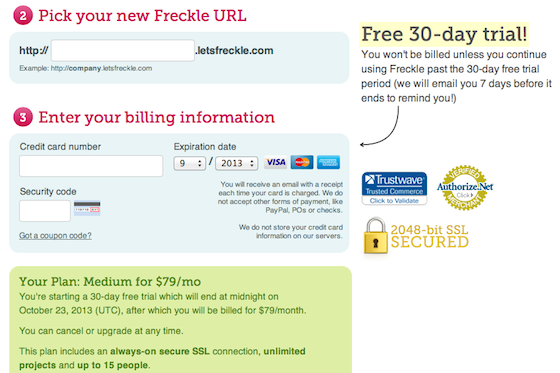If you don’t say anything, they’ll churn. If you bother them too much, you’ll piss them off and they’ll churn. Getting the customer communication right is hard.
But fortunately there are some things that all your customers want to know. There are messages that will increase conversions, build trust and decrease churn. Those messages are about money – customer’s money.
1. “When will you charge me?”
All customers want to know exactly what happens when they give you their credit card information.
When you try to add a free add-on to your new Heroku account, a message pops up telling that you’ll need to verify your billing info.


When you follow the link, you’ll get a blocking popup that asks for your credit card information.

When I saw that, I pressed cancel and tried again. After the third try I started wondering what went wrong.
“Why are they trying to get my credit card for this free add-on?”
“I haven’t checked their pricing – will this add-on invoke something else that costs something?”
“Why are they doing this sneakily like this? Will they even let me know when I use something that will cost me? Or will they just charge me behind my back?”
I eventually did find answers to my questions – but not easily. Not asking the credit card information up front should not be an excuse to communicate the pricing & billing poorly.
Now, here’s an example of good customer messaging from Freckle:
 

This form doesn’t just ask my credit card number, it tells me very clearly what will happen next.
I don’t have to go back to check that I picked the right plan for trial. I don’t need to worry that I’d be charged by accident after the trial – they promise to remind me before the trial is up. And it clearly says that they will bill me after the trial, not before like some services do.
This form kills all the worries I had about giving up my credit card information. It doesn’t only increase conversions, it helps me trust that things are done right in this company. Of course it’s just my perception – but that’s all that matters to me as a customer.
2. “What will happen when my quota is up?”
Another situation where keeping your customer’s trust needs clear communication is the upgrade.
The customer doesn’t know how you have handled the quota enforcement and that drives her crazy.
“Will the service stop working when the quota is up? Will I lose customer data because of that?”
“Will they upgrade me automatically? Will I get a surprise bill?”
People worry in advance and some even restrict their resource usage. All the choices are bad for them – except you sending them an email that tells them exactly what is going to happen.
My upcoming service, UpgradeBooster, will help you with that – making sure that both you and your customer will benefit.
In my opinion, you should never cut important functionality from your customer – not even when the quota is up. It’s ok to prevent her from engaging new resources beyond the quota limit, but it’s not ok to do something to her existing resources that will halt her business. Don’t screw up your customer.
You also shouldn’t charge more automatically – you’ll lose the customer’s trust. All the decisions about the charging should be customer’s to make.
3. “What is this line in my credit card statement?”
You’ll want to make sure that people don’t ask chargebacks from their credit card company just because they don’t remember what they bought.
In my opinion cutting churn by not sending the monthly invoice receipts will hurt you in the long run. I hope it’s not becoming a common practice.
So send the invoice receipt on time and make sure it clearly says how much money you charged, what was purchased and when will the next billing date be. You should also include a line telling how the charge will appear in their credit card statement.
If you are dealing with foreign consumers, also explain that the credit card company will do the currency conversion using their rates and that’s the reason why the amount charged may differ month to month.
Your customers like to feel in control
The common nominator in all the above cases is that people forget – yet they hate the feeling that they don’t know what’s going on. They want to be in control, but they have more important things to do than to remember small things about their service subscriptions. If you want to provide good service, you’ll help your customer with those little things.
The post 3 Things Your Customers Want You to Tell Them appeared first on Happy Bootstrapper.

















